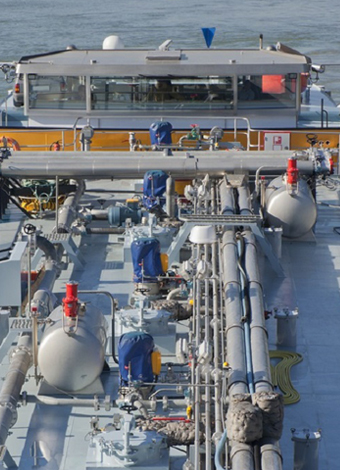London, 30 August (Argus) — Oil products held in independent storage
tanks in the Amsterdam-Rotterdam-Antwerp (ARA) trading hub fell nearly
5pc this week to 5.15mn t, prompted by stock draws on all major products
except jet fuel.
Gasoline stocks fell by 1.9pc to 757,000t, the lowest level since
November 2016. The European market is preparing to switch to
winter-specification gasoline in September, and is shedding summer-grade
volumes. Outflows were notably high to North America, Latin America and
west Africa.
Spot booking for tankers loading during the week to today were around
twice the level recorded over the prior week. Tankers left for the
Mideast Gulf, the Americas and west Africa. Tankers arrived from the
Baltic region, Denmark, Finland, France, Sweden and the UK. Low water
levels on the Rhine river inhibited barge traffic from inland refineries
to the ARA area.
Naphtha stocks fell heavily for a second consecutive week, to a
16-week low of 251,000t. The reduction was caused by good demand from
gasoline blenders and petrochemical end-users in Europe. Naphtha flows
from ARA into the continent have proven more resilient to high barge
freight rates than have flows of gasoline and gasoil, as most end-users
are unable to significantly alter feedstock slates. Tankers arrived from
Latvia, Portugal, Russia and Spain, and none were recorded leaving the
area.
Gasoil stocks fell by 5.6pc to 2.44mn t, the lowest since early
April. Rhine water levels rose marginally in recent days, potentially
allowing an increase in product flows. German 10ppm and 50ppm diesel
barges have found support over the last week. The former traded recently
at 25¢/t discounts to Ice September gasoil, compared with discounts of
$1/t around a week earlier. German 50ppm barges assessed differentials
climbed to discounts of $7.50/t to Ice September gasoil, compared with
discounts of $10.50/t a week earlier. Tankers left ARA for France,
Sweden and west Africa.
Jet fuel stocks rose by 4.6pc to 677,000t. The STI Selatar and Dubai Brilliance arrived
at Rotterdam at the end of last week, each carrying 90,000t of jet fuel
from Yangpu, China, and Ruwais, UAE, respectively. Shell exported
30,000t of jet from Rotterdam on the Seashark, which arrived at
Copenhagen today. High northwest European import volumes from east of
Suez last week and this week have not been reflected in stock levels,
suggesting sufficient demand to absorb incoming volumes. A slowdown in
arrivals after next week, alongside the start of the refinery turnaround
season, could see the market tighten.
Fuel oil inventories fell by 7.1pc to 1.03mn t. Tankers left ARA for
the Mideast Gulf and Mediterranean regions during the week, and arrived
from France and Russia.
Reporter: Thomas Warner






